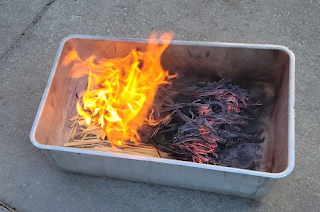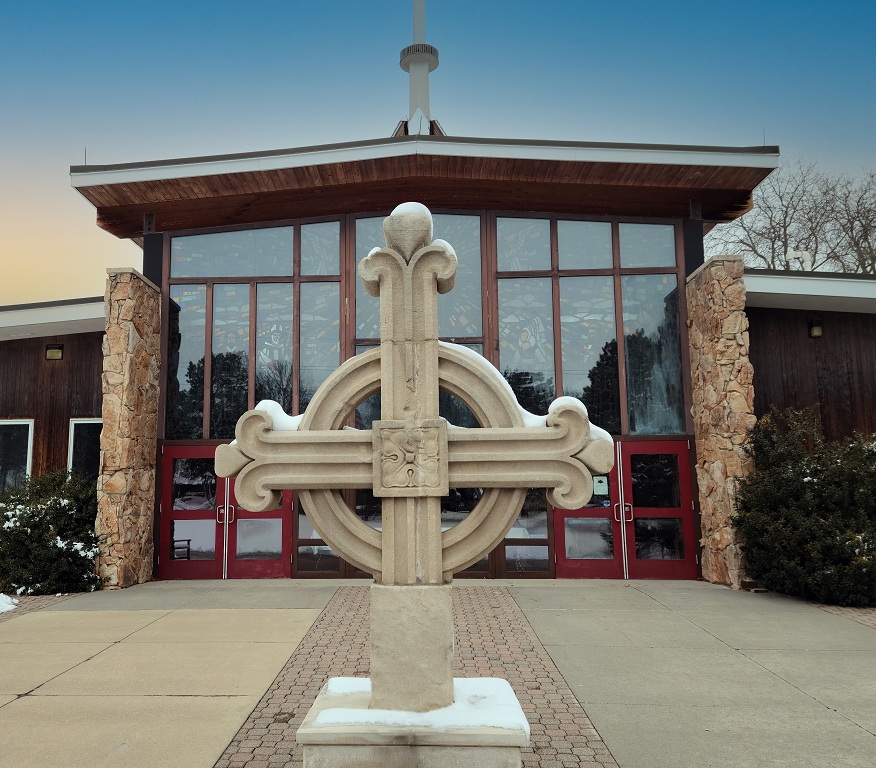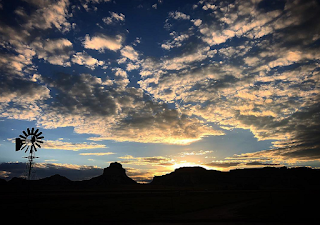Would that all the Lord's people were prophets
 |
| John Singer Sargent, The Frieze of the Prophets-West Wall Zephaniah, Joel, Obadiah, and Hosea |
While Jesus was standing there, he cried out,
“Let anyone who is thirsty come to me, and let the one who believes in me
drink. As the scripture has said, ‘Out of the believer’s heart shall
flow rivers of living water’ (John 7:37b-38b).
Would that all the LORD's people were prophets, and that the LORD would put his spirit on them! (Numbers 11:29b)
I look around me today, and I see an epidemic of thirst. There is a thirst to escape these times of quarantine and loneliness; a thirst for compassion and for a common understanding of truth and values; a thirst for visionary and compassionate leadership; a thirst for meaningful and fairly-compensated work; a thirst for justice. We are parched and withered, and maybe afraid that this drought leaves us vulnerable to the possibility of some sort of fiery destruction.
Today, on the Feast of Pentecost, Jesus
offers us living water to quench our thirst. The phrase “living water” is an ancient
expression for fresh, flowing water—the water you get from rivers, not from a
standing well, a well that might have turned into a cesspool or become poisoned.
Jesus says this at a Jewish festival signifying God's provision for Israel
during their wilderness wanderings. For seven days during this festival, water
was carried in a golden pitcher from the Pool of Siloam to the temple, as a
reminder of the water that flowed from the rock in the desert (Num 20:2-13) and
as a symbol of hope for God’s deliverance. Jesus is the true water of life;
Jesus turns symbol into reality: the reality of healing in spirit and body; the
reality of hope for the broken, the lost, the lowly, and the rejected; the
reality of new and unending life in Him.
But the Feast of Pentecost brings not only this
living water; it also brings fire. Not scorching fire that hits the dry kindling
of our world and consumes us, but the holy fire of the Spirit that purifies us—a
refiner’s fire that cleanses us of things that take, rather than give,
life. This fire of the Spirit, if we receive it, lives in us, in our hearts and
in our minds. This fire of the Spirit, if we receive it, fills us with zeal,
and, sometimes, even shame, and sometimes even rage, so that we are emboldened
to live up to the promises we made in baptism: our promise to renounce the evil
powers of this world which corrupt and destroy the creatures of God; our
promise to proclaim by word and example the Good News of God in Christ; our
promise to seek and serve Christ in all persons, loving our neighbor as ourselves;
our promise to strive for justice and peace among all people, and our promise
to respect the dignity of every human being. We all made these promises; we all
renew them every time there is a baptism here at this church.
There have been fires this week around the
country, frightening and consuming fires lit from our dry and thirsty kindling.
It might be nice to try to ignore them…but then…they come too close to home to
be ignored. You might honestly and reasonably be afraid of the protests you saw
this week. The best statement I know about them was written 53 years ago, in
1967, written and spoken by Dr. Martin Luther King, Jr. Dr. King said,
So I will continue to
condemn riots, and continue to say to my brothers and sisters that this is not
the way. And continue to affirm that there is another way. But at the same
time, it is as necessary for me to be as vigorous in condemning the conditions
which cause persons to feel that they must engage in riotous activities as it
is for me to condemn riots. I think America must see that riots do not develop
out of thin air. Certain conditions continue to exist in our society which must
be condemned as vigorously as we condemn riots. But in the final analysis, a
riot is the language of the unheard. And what is it that America has failed to
hear? It has failed to hear that the plight of the Negro poor has worsened over
the last few years. It has failed to hear that the promises of freedom and justice
have not been met. And it has failed to hear that large segments of white
society are more concerned about tranquility and the status quo than about
justice, equality and humanity. And so in a real sense, our nation's summers of
riots are caused by our nation's winters of delay. And as long as America
postpones justice, we stand in the position of having these recurrences of
violence and riots over and over again. Social justice and progress are the
absolute guarantors of riot prevention.
Dr. Martin Luther
King, Jr. April 14th, 1967, Stanford University
It might be nice to hope that the protests
and fires would just disappear. It might be nice to hope that the pandemic and the
economic crisis that have turned everything upside down in our lives will soon
just disappear. It might be nice to hope that things will soon just return to
normal.
But, my friends and family, this living
water that Jesus gives us is not just for making our own lives nicer and slaking
our own thirst; it is not for returning us to normal. This living water comes
with the promise by Jesus that we believers will become
channels of life to others, that out of our hearts will flow
rivers of living water. If we claim to be followers of the Jesus who gives us this
living water and this Pentecost fire of the Spirit, we cannot be
satisfied with the nicety of returning to normal. We have to acknowledge that
for so many Americans, “normal” means being treated differently because of
race. In so many aspects of life—not only in health care, policing, education,
and the justice system, but in simple daily activities like walking down the
street, or sleeping in your house, or walking to the convenience store in a
hoodie, or bird watching in a park—“normal” means being at best being harassed and
shortchanged, and at worst being tragically killed.
As those whose hearts are a source of living
water and whose lives are filled with the Holy Spirit, we have to acknowledge
that there are significant, quantifiable racial disparities that cannot be
ignored, in household wealth, job opportunities, healthcare, incarceration,
educational opportunities…racial disparities in nearly every aspect of the life
we find so normal. We have to acknowledge that because of our systems and our
assumptions and our history, we, sitting here in our virtual pews and our
comfortable neighborhoods, are privileged, and we have to acknowledge are
commanded over and over again by God to heal our systems and inform
our assumptions and acknowledge our history and then lift up
those who have been cast down by them.
What does this mean for us, in day-to-day
practice? Certainly, it does not mean that we will always feel God's Spirit or
feel “spiritual.” But it does mean that as disciples of Jesus we should
expect God's Spirit to work in us and through us regularly. Peter today quotes the
prophet Joel, saying “In the last days it will be, God declares, that I will
pour out my Spirit upon all flesh, and your sons and your daughters shall
prophesy, and your young men shall see visions, and your old men shall dream
dreams. Even upon my slaves, both men and women, in those days I will pour out
my Spirit; and they shall prophesy” (Acts 2:17-18). In the Old Testament
reading for today, which we did not hear but is printed on the last page of
your bulletin, Moses proclaims, “Would that all the LORD's people were
prophets, and that the LORD would put his spirit on them!"
With Pentecost, Moses’ wish is fulfilled:
we are all now prophets. We are brought to new life through the
water of Baptism, and in those waters Jesus fills our hearts to overflowing so
that they will gush forth with new life for the healing of the world. This new
life does not mean that we are perfect or that we can boast of our virtue—what
it means is that through the fire of the Holy Spirit there is a new agent of
transformation at work inside us.
We are to be those prophets who see visions
and who dream dreams. It is our mandate, the one Jesus gave us on Maundy
Thursday, to love one another, so that by our love they will know we are his
disciples. It is our mandate to leave our comfort zone and to be advocates for
justice. It is not possible to look at the distribution of COVID deaths in our
state and not see clear evidence of our systemic racism and economic division.
It is not possible to look at the on-going episodes of violence against Black and
Brown Americans and not see hundreds of years of hatred and abuse and fear that
still lives today.
The Old Testament is clear that false
prophets proclaim what the establishment wants to hear, but true
prophets are driven by the Spirit to proclaim the Word from God that people do not
always want to hear (Jeremiah 28). With Pentecost, God’s Spirit
has been put upon us, and we are, each of us, true prophets. We are
commissioned not to accept easy and comfortable platitudes, but to dig for and
speak deeper truths, even when they are hard to hear. We are tasked not to seek
a return to the status quo, but to strive with hope and courage as we work for
God’s Kingdom come on earth as it is in heaven. We are mandated not to be frozen
in fear or complacency in our comfort zones, but to be powerful advocates for God’s
justice for all the oppressed. We are charged not to have stony
hearts, but to have hearts overflowing with rivers of Jesus’ abundant living
water for the parched earth, and we are called to invite all who thirst to come
and drink.
Would that all the LORD’s people were
prophets. Amen.




Comments
Post a Comment